Only China Attends Iran’s ‘International’ Tech Trade Show
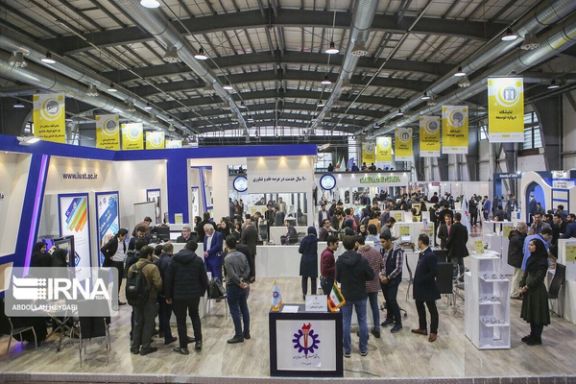
Iran will hold an international exhibit of communication and information technologies next week with only Chinese companies participating, officials said.

Iran will hold an international exhibit of communication and information technologies next week with only Chinese companies participating, officials said.
Hamed Biazar, an official in charge of the exhibition said that organizers tried their utmost to secure the presence of other countries about the event, but their attempts failed.
Iran is under US and some European sanctions that deter international firms from dealing with the Islamic Republic. Any dealing with Iran could constitute a potential violation of sanctions. Repeated hostage taking of foreign nationals by the Iranian authorities is another factor in drastically reducing travel to the country.
Biazar said that even Russian firms refrained from participating in the exhibition, which left only six Chinese companies as the only foreign entities present.
Another official, however, argued that the absence of foreigners is related to the Christmas holidays but did not explain why Muslim countries are absent.
Iran is also accused of vast cyber disruption activities and sophisticated hacking operations around the world. Microsoft and other major tech companies have repeatedly reported illicit Iranian cyber activities.
The government also has one of the world’s most restrictive internet access policies, with thousands of websites and most major social media sites blocked.
Attendance has declined in similar trade exhibits in recent years. An electronics and computers show last year reportedly attracted 120,000 people while the same event a decade ago brought more than 400,000 people to the venue and many foreign countries and firms were present.
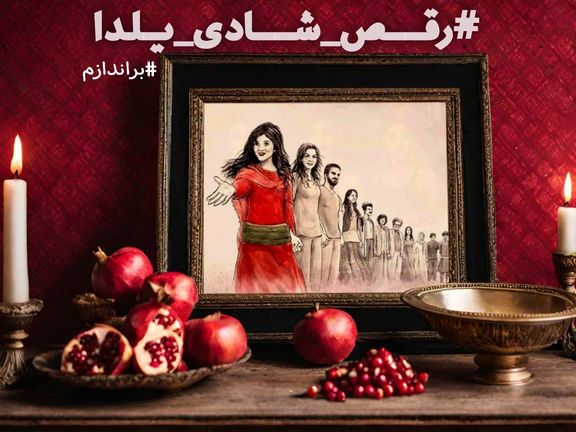
Authorities in Iran have resorted to marking the pre-Islamic Winter Solstice festival to placate the people angered by economic crisis and corruption scandals.
Iranian media reported in November that the Supreme Council of Cultural Revolution (SCCR) had renamed certain events on the official calendar including the pre-Islamic winter Festival of Yalda, which millions of Iranians celebrate on the night of December 21 when winter begins.
The council which is tasked with neutralizing non-Islamic cultural influences and ideologies, among other things, had decided that the day of the Winter Solstice be referred to as "Day of Promoting the Culture of Hosting and Connecting with Relatives” in the calendar.
Family of Mahsa (Jina) Amini, remembering their daughter on the longest night of the year.
Many believed that this irrelevant name was an onslaught on the deep-rooted culture and customs of Iranians.
Iran's religious establishment and hardliners often refer to ancient festivals as "pagan" calendar events and sometimes even demand that they should be banned. But despite endless religious propaganda, ancient traditions appear to have gained more popularity since the 1979 Islamic Revolution.
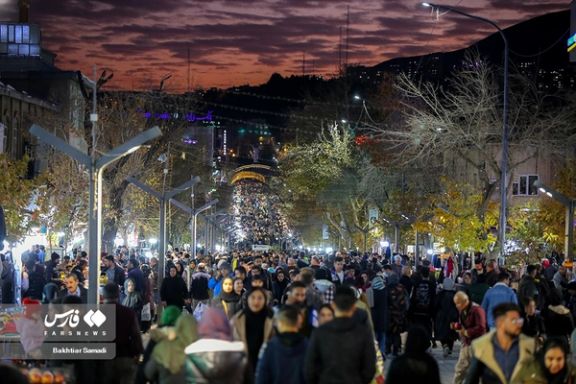
In defiance of the regime, social media users vowed to celebrate their beloved festivals such as Yalda, which they celebrate with family and friends, with even more splendor and merry-making this year, and shared numerous jokes about the lengthy new names assigned to their cherished festivals.
Municipality billboard in Tehran Honoring Yalda
The public's reaction to the renaming of the ancient festivals was so strong that the Council's spokesman, Abbas Mirza Hosseini, had to deny the removal of the names of ancient festivals from the official calendar. He claimed that the new names were only complementary and emphasized the "national identity and Islamic-Iranian culture and civilization."
In the past few days, presumably in response to such criticism, IRIB, which has a monopoly on broadcasting in the country, has shown unprecedented interest in the celebration of Yalda. It has also aired some Yalda entertainment programs including one with stand-up comedian Hassan Reyvandi who had been persona non grata at IRIB for some time.
The municipality of Tehran and some other cities also displayed an unprecedented interest in honoring Yalda. A massive billboard in Tehran’s Vali Asr Square congratulated citizens for Yalda and municipality trucks decorated with balloons and mascots played music on the streets.
The family of a victim of last year’s protests, Erfan Khazaei, celebrated Yalda at his grave.
The celebration of Yalda on the night of Winter Solstice and the Iranian New Year (Nowrouz) on the day of Spring Equinox both date to ancient, pre-Islamic times. The non-Islamic Nowrouz is still the main calendar event for most Iranians. The strength of the Nowrouz tradition is such that even the Supreme Leader Ali Khamenei makes a televised speech on that day.
Iranians send each other millions of text messages to congratulate Yalda just as they do on Nowruz, and increasingly more in recent years, Christmas and western New Year.
“I do not understand the resistance that some [in the religious and political establishment] show against elements that build culture and a sense of national identity,” former government spokesman, reformist politician and sociologist Ali Rabiei wrote in a commentary in Etemad newspaper Thursday entitled “The Indelible Yalda”.
Rabiei opined that introducing a new name for the festival in the calendar was an attempt to obscure the festival’s ancient roots through “historical transformation”. He also urged the regime to stop “engineering cultural calendar events”.
“The pressure of the people and public opinion has forced the Islamic regime to retreat repeatedly in the past 44 years in trying to ban music, short-sleeved clothes, video players, satellite TV, Yalda night, even Nowruz … Don't underestimate your power,” a tweet said.

Amid ongoing human rights abuses and military aggression across the region, the US Special Envoy for Iran delivered a message expressing solidarity with the people of Iran on Yalda night.
The stand-in envoy, Abram Paley, said: "On this Yalda night, we want the people of Iran to know that the United States will continue to support your aspirations for a free and democratic future. We are confident that Iran will overcome this period of darkness, and that brighter days are ahead."
Matthew Miller, State Department Spokesman, also joined in marking Yalda night, saying: "On the longest night of the year, we join the people of Iran and the wider region in looking forward to brighter days ahead. Happy Yalda to all who celebrate."
Yalda night, an ancient Iranian celebration, marks the longest night of the year, observed from the last night of Autumn to the sunrise of the first Winter day in the northern hemisphere.
Celebrated in multiple countries, including Iran, Armenia, Tajikistan, and Afghanistan, traditions include reading Hafez poetry and enjoying pomegranates, watermelons, and assorted nuts.
The symbolic celebration underscores the victory of light over darkness. In Iran, where most are now living under the poverty line in the worst economic crisis in recent history, and oppression continues to deepen, many in Iran are feeling the country is in its darkest times.
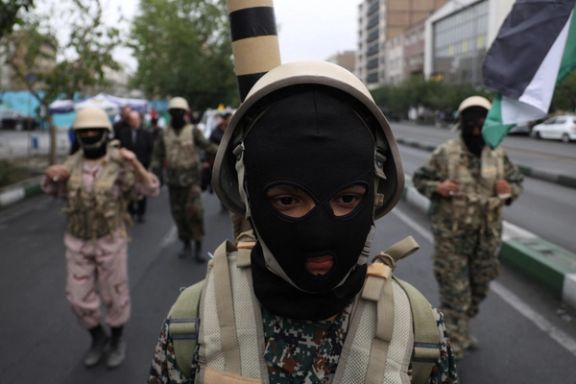
Israel's Shin Bet security agency has exposed a covert operation by Iranian operatives attempting to recruit Israelis for espionage via social media.
Posing as fake real estate brokers, drone marketers, and individuals seeking services, the operatives operated on platforms such as X, Telegram, WhatsApp, Facebook, and Instagram.
Tasks assigned to Israelis included photographing locations and verifying addresses, all in exchange for financial incentives. Trained to spot such cat-fishing during army service, several of the Israelis alerted the authorities.
The Shin Bet said it was familiar tactics of the Iranian security agencies, primarily focusing on intelligence gathering rather than explicit security matters, Iranian digital activities escalating since the outbreak of the Gaza war on October 7.
“Its purpose is to assist Hamas in its war and to damage Israel’s national resilience and war effort, sowing demoralization and deepening social divisions,” the agency said in a statement.
Shin Bet also uncovered social media pages impersonating Israelis, “making cynical and manipulative use of the issue of the hostages, and even trying to act against families of hostages and bereaved families.”
Screenshots released by Shin Bet show an Iranian operative allegedly soliciting an Israeli for a murder plot, negotiating a payment of 70,000 euros. An audio recording features an Iranian operative speaking in Hebrew, offering $100 to an Israeli for an unspecified task.
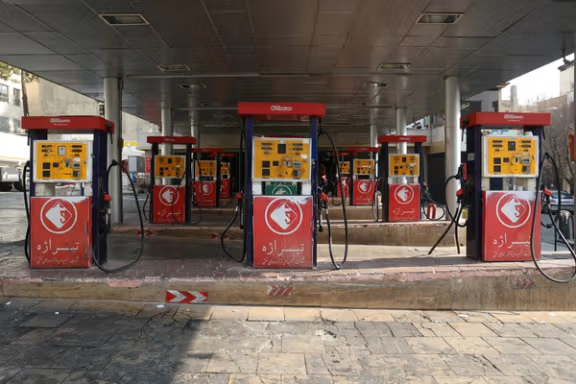
A member of the Energy Committee of the Iranian Parliament claimed that the cyber attack on Iran's fuel supply system was carried out “from inside.”
Parviz Mohammadnezhad Ghazimahalleh said on Thursday that the the attack which cut off 70% of the country's petrol stations was a “physical” one. “They entered the system via a USB or a program from inside,” he added without specifying the identities of the people involved.
On Monday, the cyberattack which crippled gas stations across Iran was claimed by the hacking group "Gonjeshk-e-Darande" or Predatory Sparrow which announced the attack on X, claiming that they took out “a majority of the gas pumps throughout Iran.”
Iran accuses “Gonjeshk-e-Darande” of having links to Israel. The group rose to prominence as a hacktivist two years ago for a similar cyberattack on fuel distribution centers across Iran on the eve of the second anniversary of the bloody suppression of the November 2019 protests. In a separate incident, they claimed responsibility for hacking the state railway company.
It is the second time such an attack has taken place, Ghazimahalleh said, accusing the responsible officials of “negligence” and “carelessness.”
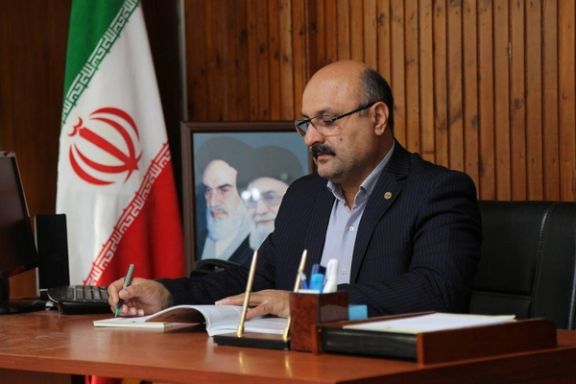
The remarks came a day after Hadi Beigi-Nezhad, another member of the Energy Commission of Iran’s parliament, said a cyber virus had infected the fuel system, attributing it to an individual and a network that had infiltrated the country.
Last year, “Gonjeshk-e-Darande” garnered attention for successfully penetrating the computer systems of major steel companies in Iran.
Tejarat News, an economic news website, announced on Thursday that the majority of gas stations in Tehran province have been reconnected to the online distribution system.
Out of a total of 330 gas stations in the province, 239 are now connected to the national fuel system, Tejarat News quoted a local official as saying.
Also on Thursday, Morteza Mahmoudvand, another Iranian lawmaker, blamed “Zionists” and Israel’s intelligence agency Mossad for the fuel system attack and urged “an equilibrium of fear” in order to fight what he called the country’s enemies.
Equilibrium of fear means doing to them what they do to us, added Mahmoudvand, who is a member of the National Security and Foreign Policy Commission of the Iranian parliament.
He claimed that Israel’s cyber operations against Iranian targets will go on even after the Gaza conflict. We need to prepare ourselves in digital, technological and virtual domains not to be vulnerable to future attacks, he went on to say.
This is while the Islamic Republic has already been involved in several cyber operations against Israeli targets.
Earlier in the month, Iran-linked hackers targeted a water facility in the rural area of County Mayo in Ireland, leaving the residents without water for two days.
The attack was carried out by pro-Iran Cyber Av3ngers group which wrote a message on the infected computer system and claimed that the facility was targeted because it used Unitronics Vision Series programmable logic controllers (PLCs), an Israeli-made piece of equipment.
In November, Microsoft’s Threat Analysis Center reported that the Islamic Republic has intensified its cyberattacks and influence operations since 2020, targeting the likes of Israel and Bahrain, one of the Persian Gulf states to make peace with Israel under the 2020 Abraham Accords, brokered by the US.
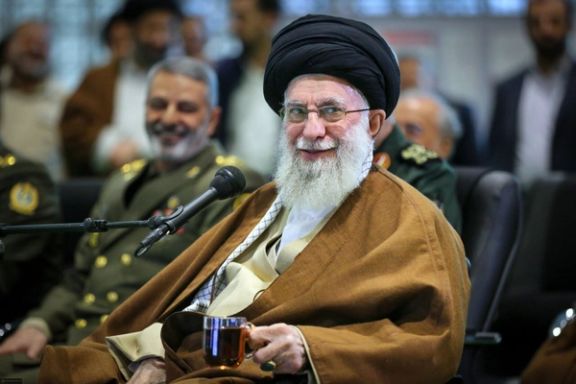
The representative of Iran's Supreme Leader in Kerman, claims that the residents of the province are keen to meet the long-time Supreme Leader in a bid to undermine unrest.
Hassan Alidadi Kermani noted, "The population of Kerman province exceeds three million people, and there is a collective wish for everyone to have the opportunity to visit Khamenei."
However, his remarks unfold against a backdrop of growing discontent among the majority of Iranians who hold Khamenei accountable for the deaths of civilians in anti-regime protests over the past years. Kerman in particular has been a hotbed of unrest in the wake of the September 2022 uprising, sparked by the death in morality-police custody of Mahsa Amini.
Opposition figures assert that the repressive forces, including their commanders, share responsibility for the aggression during the 2022 protests and blame Iran's Supreme Leader, Khamenei, as the central figure responsible for the atrocities and aggression.
A rights group report says that in November 2019, security forces of the Islamic Republic allegedly killed at least 3,000 protesters during demonstrations triggered by a significant fuel price hike. The protests swiftly transformed into calls for government overthrow and opposition to Khamenei. Reuters, at the time, reported 1,500 deaths.
Recent reports from rights groups shed light on the aftermath of protests sparked by the 2022 death of Mahsa Amini in custody. The reports indicate that over 500 people, including minors, lost their lives, thousands were injured, and 22,000 were arrested. In response, the Iranian government has imposed several death sentences for demonstrators, with some already executed.
The Iranian judiciary claims the verdicts were issued through fair trials, but details were not disclosed. Concerns persist over the lack of due process, restrictions on defendants choosing their legal representation, and the overall transparency of the legal proceedings in such cases.